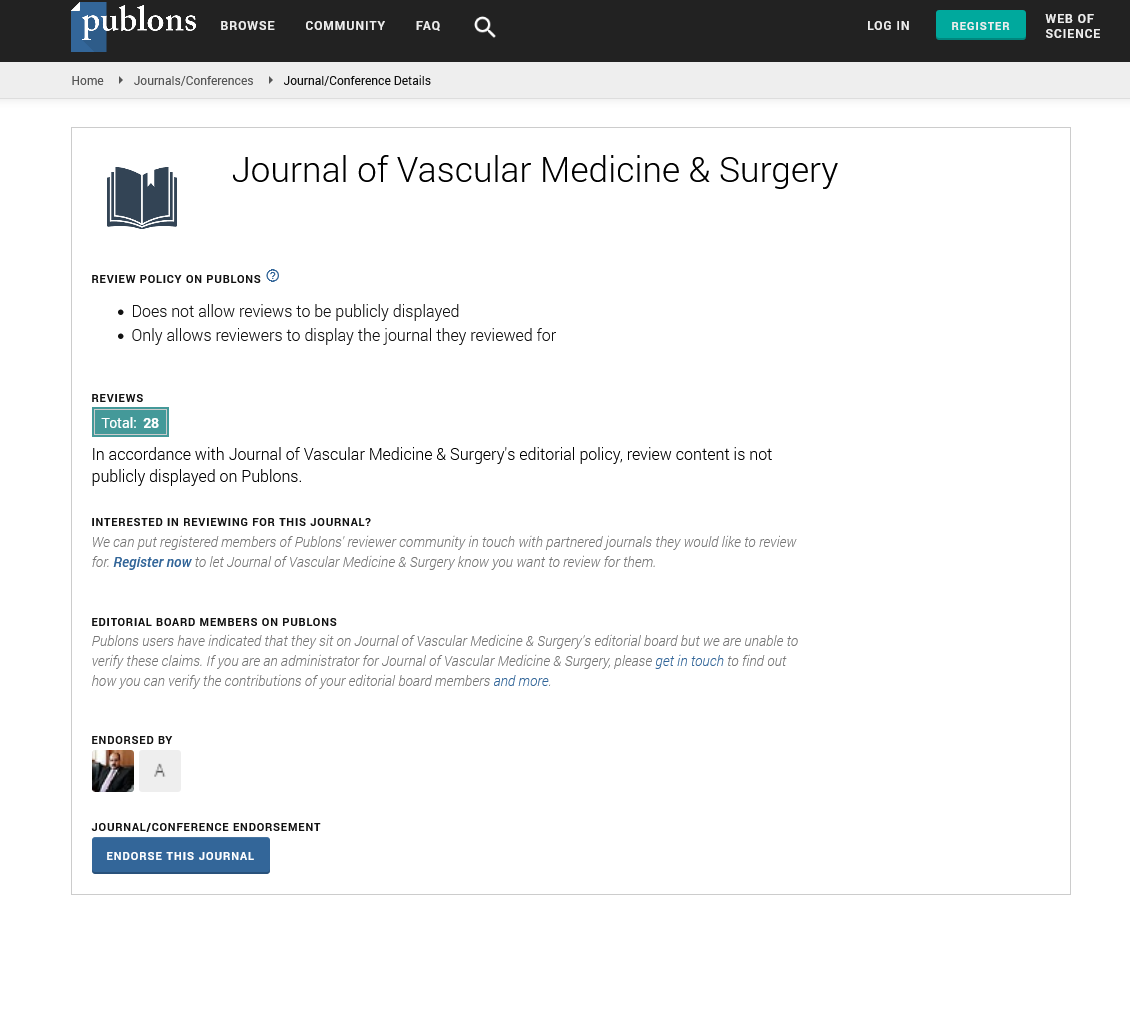Indexed In
- Open J Gate
- Academic Keys
- RefSeek
- Hamdard University
- EBSCO A-Z
- OCLC- WorldCat
- Publons
- Euro Pub
- Google Scholar
- SHERPA ROMEO
Useful Links
Share This Page
Journal Flyer

Open Access Journals
- Agri and Aquaculture
- Biochemistry
- Bioinformatics & Systems Biology
- Business & Management
- Chemistry
- Clinical Sciences
- Engineering
- Food & Nutrition
- General Science
- Genetics & Molecular Biology
- Immunology & Microbiology
- Medical Sciences
- Neuroscience & Psychology
- Nursing & Health Care
- Pharmaceutical Sciences
Short Communication - (2021) Volume 0, Issue 0
Vascular Surgery Procedures in Patients with COVID-19 Infection
Anita Chawla*Received: 04-May-2021 Published: 28-May-2021, DOI: 10.35248/2329-6925.21.s5.003
Abstract
Most people infected with the COVID-19 virus will experience mild to moderate respiratory illness and recover without requiring special treatment. Older people and those with underlying medical problems like cardiovascular disease, diabetes, chronic respiratory disease, and cancer are more likely to develop serious illness.
Patients with COVID-19 infection undergoing vascular surgery procedures showed poor 30-days survival. Age >65 years, preoperative lymphocytes <0.6 (x 109/L) and LDH >500 (UI/L), and postoperative acute renal failure, ARDS and need for major amputation were identified as prognostic factors of 30-days mortality.
Keywords
COVID-19; Surgery; Heart; Vascular disorders, Treatment
Description
Coronaviruses are a group of related RNA viruses that cause diseases in mammals and birds. In humans and birds, they cause respiratory tract infections that can range from mild to lethal. Mild illnesses in humans include some cases of the common cold (which is also caused by other viruses, predominantly rhinoviruses), while more lethal varieties can cause SARS, MERS, and COVID-19.
Lung injury and acute respiratory distress syndrome have taken center stage as the most dreaded complications of COVID-19, the disease caused by the new coronavirus, SARS-CoV-2. But heart damage has recently emerged as yet another grim outcome in the virus's repertoire of possible complications.
During the COVID-19 pandemic, a cost-benefit analysis of any vascular patient undergoing surgery should be conducted, based on the importance of the surgery and the risk of viral illness and transmission. In the COVID-19 era, there is very little data on emergency surgical treatment. Although the effects of perioperative physiological stress on predisposition to or recovery from COVID-19 are unknown, it is thought that perioperative COVID-19 infection worsens the prognosis of those who contract the virus [1].
COVID-19 has contributed a huge negative effect all over the world. As the population continues to be affected by a wide range of preexisting diseases, hospitals have become inundated with COVID-19 patients, forcing the majority of surgical departments to reschedule their activities, prioritising urgent or emergent and non-deferrable situations. Patients with vascular diseases are especially prone to the development of complications if infected by COVID-19. The primary goal of this study was to assess 30- day mortality in COVID-19-infected patients who had vascular surgery. Secondary end points included seven-day mortality, 30-day re-intervention, respiratory failure, ARDS, and sepsis.
The financial impact on vascular surgery practise has yet to be determined. We speculated that vascular surgery divisions have suffered losses on both the hospital and professional sides that would be impossible to recover without major productivity gains [2]. Vascular surgeons were generally in agreement about delaying claudication cases but not that involving tissue damage, but there was substantial disagreement when it came to patients with rest pain, with roughly half of the respondents saying they would postpone and the other half saying they would not [3]. The coronavirus disease 2019 (COVID-19) pandemic has altered our personal and professional lives in ways that were inconceivable only months ago. As COVID-19 infections caused by the SARS- CoV2 (severe acute respiratory syndrome coronavirus 2) [4].
How Does the New CoronaVirus Stoke Cardiac Damage?
First, people with preexisting heart disease are at a greater risk for severe cardiovascular and respiratory complications from COVID-19. This is hardly a surprise. Research has shown that infection with the influenza virus poses a more severe threat for people with heart disease than those without cardiac problems. Research also shows that heart attacks can actually be brought on by respiratory infections such as the flu. Second, people with previously undiagnosed heart disease may be presenting with previously silent cardiac symptoms unmasked by the viral infection. In people with existing heart-vessel blockages, infection, fever and inflammation can destabilize previously asymptomatic fatty plaques inside the heart vessels. Fever and inflammation also render the blood more prone to clotting, while also interfering with the body’s ability to dissolve clots-a one-two punch akin to throwing gasoline on smoldering embers.
Conclusion
During the COVID-19 pandemic, acute limb ischaemia was the most frequent vascular disease requiring surgical treatment. COVID-19 was associated with a fourfold increased risk of death and a threefold increased risk of major adverse events.
REFERENCES
- Norberto EMS, Haro JD, Peña R, Riera L, Fernández-Caballero D, Sesma A, et al. Outcomes After Vascular Surgery Procedures in Patients with COVID-19 Infection: A National Multicenter Cohort Study (COVID-VAS). Ann Vasc Surg. 2021; S0890-5096: 54-61.
- Von Meijenfeldt GCI, Rydingsward JE, Van der Laan MJ, Zeebregts CJ, Christopher KB. Functional Status and Out-of-Hospital Outcomes in Different Types of Vascular Surgery Patients. Ann Vasc Surg. 2021; S0890-5096: 280-86.
- Aziz F, Bath J, Smeds MR. Implications of the severe acute respiratory syndrome associated with the novel coronavirus-2 on vascular surgery practices. J Vasc Surg. 2021; 73(1): 4-11.
- Kahlberg A, Mascia D, Bellosta R, Attisani L, Pegorer M, Socrate AM, et al. Vascular Surgery During COVID-19 Emergency in Hub Hospitals of Lombardy: Experience on 305 Patients. J Vasc Surg. 2021; 61(2):306-315.
Citation: Chawla A (2021) Vascular Surgery Procedures in Patients with COVID-19 Infection. J Vasc Med Surg.S5:003.
Copyright: © 2021 Chawla A. This is an open-access article distributed under the terms of the Creative Commons Attribution License, which permits unrestricted use, distribution, and reproduction in any medium, provided the original author and source are credited.

